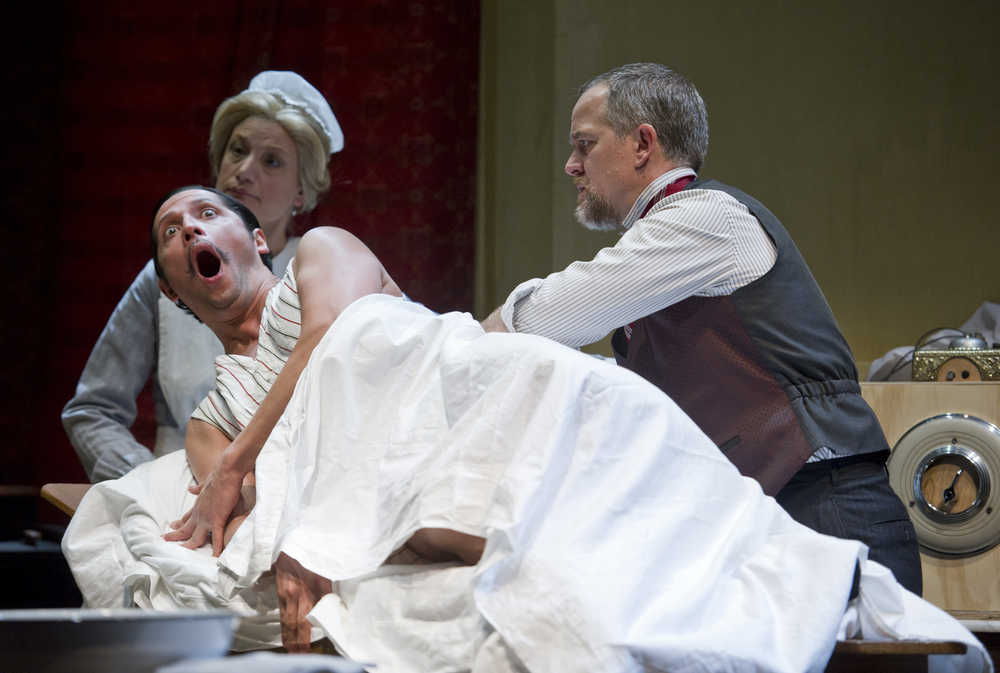Shocking acts are being performed onstage at Perseverance Theatre, complete with electronic devices and screaming orgasms.
However, before the perverts and protestors descend upon Douglas Island I should clarify: These encounters aren’t erotic; they’re therapeutic. The implements are wielded by a medical professional, the moaning convulsions simply part of the treatment – at least that’s what doctor and patient believe. In fact, sexual pleasure — particularly female sexual pleasure — is so removed from the minds of those involved, they don’t even recognize it taking place in the next room. Literally.
That’s the nut of Sarah Ruhl’s comedy “In the Next Room (or The Vibrator Play),” which runs through April 2 at Perseverance—the disconnect between the characters’ and audience’s notions about what, exactly, that strange buzzing wand is and how its magic should be applied.
Set in the 1880s, right after the advent of electricity, “In the Next Room” explores the historically documented practice of treating “hysteria” in women by inducing “paroxysms” via “vulvular massage,” either manually or with the latest breakthrough in medical technology: the vibrator.
The play follows Dr. Givings (Torsten Hillhouse), a highly successful gentleman physician specializing in this treatment, and his wife Catherine (Christina Apathy), who grows ever more fascinated with — and distanced by — the curious doings in her husband’s adjoining medical office.
Dr. Givings’s chair is entirely different than Sweeney Todd’s, and his patients meet a far more pleasant end. Off go the corsets, up come the petticoats and on turns a Rube Goldberg contraption I can’t believe any woman would allow beneath her pantaloons.
And yet, women do. Early on, we meet new patient Mrs. Daldry (Margeaux Ljungberg), who exhibits all the classic “symptoms” of hysteria: headaches, sensitivity, weeping. Apprehensive at first, within moments she’s, um, let’s call it “singing the body electric.” That’s nothing compared to the, er, “epiphany” experienced by rare male hysteria sufferer Leo Irving (Enrique Bravo), whose entire life changes the moment the doctor “engages his prostate” with a “Chattanooga vibrator,” which kind of looks like a cappuccino machine with a phallic attachment.
Meanwhile, there’s one woman Dr. Givings won’t help. Trapped by Victorian-era convention and post-partum depression, Catherine Givings (Christina Apathy) doesn’t understand what her husband is doing and why he won’t do it to her.
It’s a juicy premise from a comic standpoint; plenty of good humor in the treatment of “ill humors.” But more serious ideas underpin “In the Next Room,” with many modern echoes: repression, ignorance, blind embrace of technology and the subjugation of women by men. Breaking the confines of her gender, “In the Next Room” is as much about sexual release and as it is about sexual release.
Director Carolyn Howarth, whose Perseverance credits include “Vanya and Sonia and Masha and Spike” and “The Importance of Being Earnest,” brings a keen awareness to a play in thought and feeling that goes beyond all the sex jokes. And both the stage and the characters are exquisitely dressed by lighting/scenic designer Art Rotch and costume designer Clare Henkel.
But the production’s real strength lies in its cast.
Torsten Hillhouse strikes a nearly perfect balance of kindness and confusion as the well-intentioned but grossly imperceptive Dr. Givings, businesslike and clinical, a man who continues to make inane small-talk even as his patients start to writhe.
Margeaux Ljungberg’s Mrs. Daldry bounces back and forth between stiff parochialism and unbridled passion. And she really delivers her “lines.” (I’ll have what she’s having.)
Perseverance actor-in-residence Enrique Bravo portrays Leo Irving with a histrionic swagger and fellow Perseverance actor-in-residence James Sullivan delivers laughs as the patriarchal and lovably self-centered Mr. Daldry—“ thank you, Dr. Givings, you have no idea what source of anguish my wife’s illness has been to me…. and to her, of course.”
Tiffany Cooper brings a measured dignity to the role of Mrs. Givings’ wet nurse Elizabeth, repressed as a woman as well as an African American barely two decades removed frm the Civil War. And Katie Jensen delivers a comically brisk performance as Dr. Givings’s crisp but sympathetic midwife assistant Annie, who wound up in nursing because she’s “33, unmarried, and detests young children.”
The cherry atop this sundae: Christina Apathy. Her Mrs. Givings is madcap impulsiveness bound in a corset, a modern woman trapped in history. With a tendency to speak her thoughts before she’s fully thought them through, she seems more in touch with herself — no pun intended — than any other character in the play.
Adding the development of multiple side plots, as well as lengthy discourses on topics such as scientific progress, artistic inspiration and ancient Greek scholarship, “In the Next Room” feels a bit crowded at times, not to mention a little long. The second act veers into more typical Victorian drawing room fare, complete with intersecting love triangles, convenient entrances and exits and witty aphorisms (several at the expense of the French). And as the play wears on, the laughs grow increasingly sparse, disappearing entirely toward the end. Don’t worry; I won’t spoil it for you.
But I will say this: Personally, I prefer my comedies to go out with a bang (okay, that pun was intended). Here, the jokes give way to a far more beautiful and moving finish. And sometimes, a beautiful and moving finish is just what the doctor ordered.

